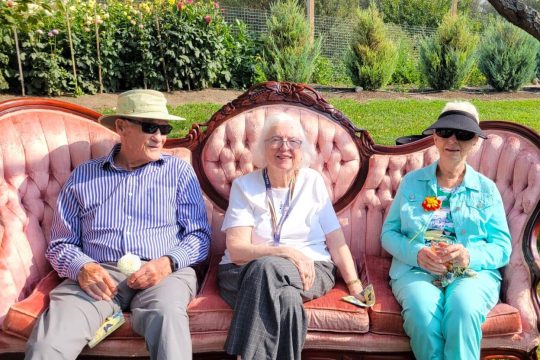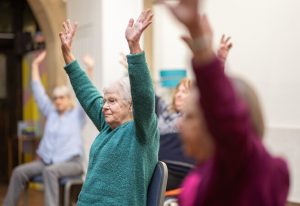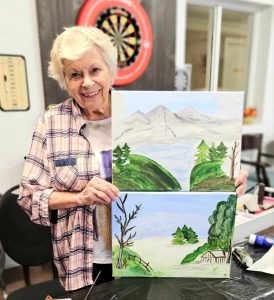
When the topic of retirement comes up, most people tend to focus on two questions: “When can I retire?” and “How much money will I need to retire?”
But ask any retiree, and they will tell you that those questions are only part of the story. The key to a fulfilling retirement is not how to fund it, rather “How do I want to spend my time?”
Like any major life transition, retirement is a time of shifting priorities that requires planning. And how you spend all that newfound free time can make a big difference in your health and quality of life. With that in mind, here’s how to create your retirement vision and make the most of your post-working years.
11 Habits for a Happy Retirement
 What makes people happiest in retirement? There is no doubt that financial security and good health are pillars of retirement happiness. However, as you age, you may realize that retirement offers many opportunities to set your own path and enjoy life to the fullest.
What makes people happiest in retirement? There is no doubt that financial security and good health are pillars of retirement happiness. However, as you age, you may realize that retirement offers many opportunities to set your own path and enjoy life to the fullest.
While the answer to the question can vary from person to person, there are a variety of strategies you can use to retire happy. With that in mind, here are a few retirement habits that may bring you a more joyous and fulfilling retirement.
How will I spend my time after retirement?
1. Create a Schedule
Studies have shown that a structured life is one of the keys to happiness. Prior to retirement, work and family obligations create their own schedule and structure. When you retire, your days and evenings are now filled with leisure time. While you may find this novel and a bit exciting at first, you may want to define some specific routines to maintain order and structure down the road. After all, having things to look forward to is always important in life.
Keep your dairy booked up with days out and quality time with friends and family. You can even schedule days for yourself, setting aside time to see a show or visit somewhere new, or even just relax in the garden. A happy retirement is a busy one!
2. Stay Active in Retirement
 Another key to staying happy after retirement is exercise. As one of the most important ways to boost our overall health, staying in good physical shape in retirement can help you enjoy the type of lifestyle you desire for longer. And maintaining a moderate level of activity in retirement is easier when it’s a part of your regular routine. Exercise and nutrition are key areas to address early.
Another key to staying happy after retirement is exercise. As one of the most important ways to boost our overall health, staying in good physical shape in retirement can help you enjoy the type of lifestyle you desire for longer. And maintaining a moderate level of activity in retirement is easier when it’s a part of your regular routine. Exercise and nutrition are key areas to address early.
A few examples of good physical types of exercise for older adults include:
- Walking
- Yoga or chair yoga
- Pilates
- Tai chi
- Line dancing
- Workouts with resistance bands
- Weight lifting
- Swimming/water aerobics
- Gardening
3. Build Social Relationships
According to Harvard’s 85-year happiness study, the people who fare the best in retirement find ways to cultivate connections with others. Friends give our lives meaning, comfort, and joy. They help prevent loneliness and isolation. After retirement, our work-related relationships begin to disappear, and new relationships need to be created. The more we enrich retirement – and life – with relationships, the happier we are.
4. Try Something Challenging Every Day
Whether you volunteer for a local charity/event, or check something off your bucket list, every accomplishment, large or small, provides mental stimulation, which is very important during your retirement years. Make it a habit to do something challenging every single day. Add to the excitement by encouraging your spouse, partner, or a friend to join in the activity with you. Over time, this will enhance your relationships, as well as your zest for life.
5. Pursue Hobbies and Activities
 Leisure time activities are a big contributor to fulfilment and personal satisfaction. In fact, studies show that boredom and a lack of cognitive stimulation can contribute to depression and anxiety. Retirement is a fantastic opportunity to explore interests that took a back burner to work and raising a family.
Leisure time activities are a big contributor to fulfilment and personal satisfaction. In fact, studies show that boredom and a lack of cognitive stimulation can contribute to depression and anxiety. Retirement is a fantastic opportunity to explore interests that took a back burner to work and raising a family.
6. Learn New Things
The brain is “plastic” and can continue to grow, develop, and make connections from before we are born until well into old age. When you challenge your brain with new and effortful activity, you help to build your “cognitive reserve”. Simply put, learning in your senior years supports healthy aging.
7. Volunteer and Give Back to Your Community
Volunteering is a great way to give back to your community and make a positive impact on the world around you. It can also contribute to a sense of purpose to your life in retirement.
There are many ways to volunteer in retirement, from working at a local food bank to mentoring young people in your community. Volunteering can also be a great way to meet new people and build positive relationships.
8. Travel And Explore New Places
 Retirement is the perfect time to travel and explore new places. Whether it’s visiting a new country or simply exploring your own backyard, travel can bring a sense of adventure and excitement to life. If you aren’t able to physically travel, join a travelogue or armchair travel group or take a trip to a museum with friends.
Retirement is the perfect time to travel and explore new places. Whether it’s visiting a new country or simply exploring your own backyard, travel can bring a sense of adventure and excitement to life. If you aren’t able to physically travel, join a travelogue or armchair travel group or take a trip to a museum with friends.
9. Nourish Your Spiritual Health
Often confused with religion, spirituality really refers to your sense of who you are and why you are here. Your view of the world flows directly from the values that you hold and the primary purpose of your life. What is it that gets you up in the morning and helps you feel supported through the tough times?
10. Mental and Emotional Health in Retirement
Retirement has its challenges, but with careful planning and some gradual adjustments, it can also be the time of your life. To make the ‘sugar rush of retirement’ last, pro-actively prepare emotionally for retirement. Protect your mental health by planning how you will stay involved in your community or spend more time with family and friends. This may mean seeking out new activities or groups of people with similar interests.
11. Decide Where to Live After Retirement
Perhaps you want to stay in the town where you grew up or move closer to your kids. Or you might want to move to a place that has amenities for retirees and a built-in community environment. If you opt to move, try renting a place in the new location for several months to get an idea of what life would be like there. If you are considering a senior living community, many of the top retirement residences offer short-term or respite stays to help you make the decision. There are many pros and cons to moving after retirement and you need to consider them all before deciding on where or when to relocate in the autumn of your life.
Research the Best Places to Retire in Canada and Go There
 Moving to a retirement community is an investment in your future. It can surround you with active, like-minded people, provide you with an array of activities to choose from, and there’s less home maintenance, too. Elderly adults can cherish a space that is truly their own, develop meaningful relationships, and then safely age-in-place throughout the years.
Moving to a retirement community is an investment in your future. It can surround you with active, like-minded people, provide you with an array of activities to choose from, and there’s less home maintenance, too. Elderly adults can cherish a space that is truly their own, develop meaningful relationships, and then safely age-in-place throughout the years.
With retirement residences in Alberta, Manitoba, Ontario, Saskatchewan, and Quebec, we serve seniors across Canada. Our senior homes are focused on delivering stress-free, independent senior living, top-quality care, active lifestyles, and a superior dining experience. If you want to learn more, give us a call and ask about our senior housing options near you.
The most important consideration when choosing a senior living community is the way it makes you feel – like you are home.
Writer – Julianna McLeod
Julianna is a health and wellness expert at All Seniors Care. Her mission is to create content that empowers seniors to form sustainable solutions for lasting health and happiness. She is an experienced writer, editor, and Recreational Therapist living in Toronto.
